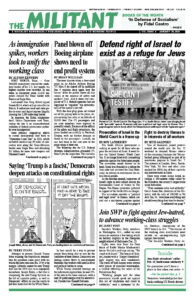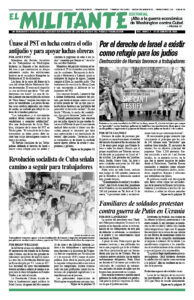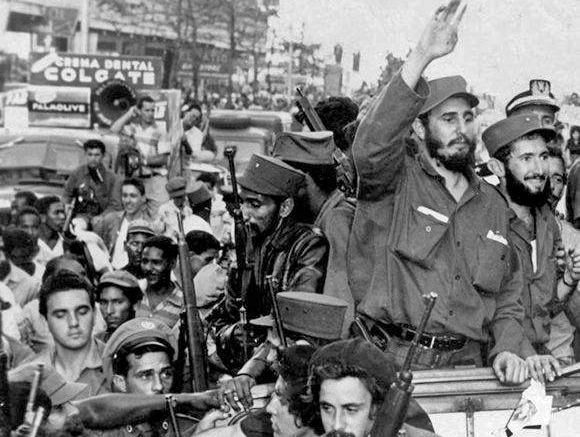One of Pathfinder’s Books of the Month for January is In Defense of Socialism: Four Speeches on the 30th Anniversary of the Cuban Revolution by Fidel Castro, its central leader. The triumph of the Cuban people on Jan. 1, 1959, bringing down the U.S.-backed Batista dictatorship, opened the way under Castro’s Marxist leadership to the first socialist revolution in the Americas. In these 1989 speeches, as the Stalinist regimes of the Soviet bloc were collapsing, Castro defended socialism as “the only hope, the only road for the peoples, the oppressed, the exploited, the plundered. And today, when our enemies want to question it, we must defend it more than ever.” The excerpt is from “The Young Generation Must Improve and Defend Socialism.” Copyright © 1989 by Pathfinder Press. Reprinted by permission.
The memory of that day when we arrived in the capital will never be erased. We had crossed the island practically from one tip to the other and a sea of people welcomed our motorcade everywhere. Thirty years have gone by since then.
Like today, there was a big crowd gathered here, perhaps bigger than this one since there was more space then. This was then a big military camp and the fate of the country was decided here, and that day it was full of people. It wasn’t a school, as it is today. There was great symbolism in the fact that the people gathered in precisely this military camp. It meant that the history of coups d’état, the history of military dictatorships had disappeared for good in our homeland. [Applause] It meant that repression and crime had disappeared for good in our country. From that time on, defending the people and the country would no longer simply be the task of the armed forces but of the entire people. …
In our nation there were many things to do. The problems we had then are not those of today; we had a whole world to change, we had a revolution to make.
I remember that our main concern that night was the question of unity among the revolutionary forces, preventing splits and clashes from breaking out among those who had fought against the dictatorship, avoiding conflicts and divisions among our people. For as Martí had believed, it was precisely conflicts and divisions that had made victory impossible in the Ten Years War. And throughout our history divisions had made it very difficult for independence to fully triumph in our nation. …
I also remember something I said that evening of January 8, that we would always have the necessary patience once revolutionary power was in our hands, and that if the day ever came when our patience ran out we would always seek more patience, all the patience required to assume the responsibilities and enormous power that a triumphant revolution bestows on its leaders. …
I believe that the changes that took place in our country have been extraordinary; the tasks we tackled then are not those of today. At that time we had a triumphant revolution within a capitalist country, within an imperialist neocolony. That entire social system had to be demolished. The ownership of our industries, our public services, our land, our mineral resources, banking, trade, practically everything, was in the private hands of a minority of exploiters. And a significant portion of all that wealth and those industries was in the hands of foreign corporations. …
Our people did not then have the level of political awareness they later acquired. They were a militant people, an enthusiastic people, a warmhearted people, a rebellious people, a people who hated crime, injustice, abuse, corruption, and embezzlement, all the vices that characterized politics in capitalist times. They were, above all, a people who hated oppression, and that was why there was an extraordinary joy prevailing in those times. …
If you asked people whether they wanted agrarian reform, they said yes. If you asked people whether they wanted a cut in rent, they were in agreement. If you asked about urban reform, they were in agreement; about freeing the peasants from middlemen, from all forms of exploitation, they were in agreement. If you asked them whether the public services, that is, telephones, electricity, transportation, or the large factories and the big banks, ought to be the property of the entire people, they were in agreement.
But if you asked some citizens whether they agreed with socialism, they said no, not with socialism, no. They didn’t know what socialism was, they didn’t know what communism was. Our people were so saturated with that propaganda that a large part of the population was not in agreement with socialism or communism, without even knowing what socialism or communism were.
That’s why during the first stage of the revolution it was necessary to implement the Moncada Program — it was generally accepted that it was, so to speak, the forerunner of socialism but it was not quite socialist. It did not yet speak of building socialism in our country.
How did our people become a socialist people? It was the revolutionary laws more than words, preaching, or reasoning that made our people socialist. When rents were cut, which profoundly affected the interests of those landlords, the entire people supported the measure. When the agrarian reform was carried out the entire people supported the decision. The interests of the workers were taken care of. Social justice was implemented with a strong hand from one end of the country to the other. For the first time in our country’s history, the state and the government ceased being on the side of the rich and put themselves on the side of the poor. When the vast majority of our population saw that the government resolutely attacked the interests of the rich and the bourgeoisie to support the people, little by little all those lies and that whole antisocialist and anticommunist campaign came tumbling down like a house of cards. In this way a new political thinking, a true political awareness was created among our people.
Never before had such fundamental changes taken place in the social life of our country. Never before had such fundamental changes taken place with regard to the means of production. Never before had such a profound change taken place in the people’s consciousness.


